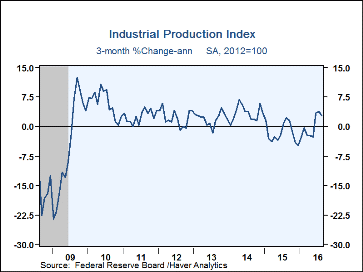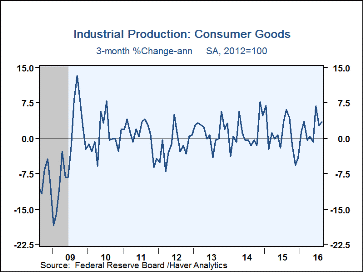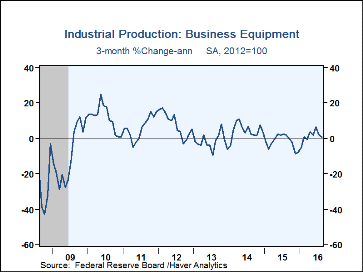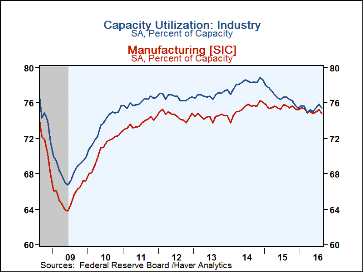 Global| Sep 15 2016
Global| Sep 15 2016U.S. Industrial Production Declines
by:Tom Moeller
|in:Economy in Brief
Summary
Industrial output declined 0.4% during August (-1.1% y/y) following a 0.6% July increase, revised from 0.7%. It was the first production decline in three months and compared to a 0.2% shortfall expected in the Action Economics [...]
Industrial output declined 0.4% during August (-1.1% y/y) following a 0.6% July increase, revised from 0.7%. It was the first production decline in three months and compared to a 0.2% shortfall expected in the Action Economics Forecast Survey.
Factory sector production fell 0.4% last month (-0.4% y/y) and reversed the prior month's rise. Consumer goods production eased 0.2% (+0.1% y/y) as machinery output fell 1.9% (-3.4% y/y). Output of electrical equipment & appliances declined 1.4% (-2.3% y/y). Appliance output fell 1.4% (+1.2% y/y), and computer & audio/video output was off 1.0% (+0.1% y/y). In the nondurable goods area, chemical production fell 0.6% (-1.0% y/y), but apparel production improved 0.1% (-9.2% y/y). To the upside was motor vehicle & parts production by 0.5% (4.7% y/y), and furniture output by 0.6% (-0.5% y/y). Paper production strengthened 0.8% (-0.5% y/y) while food, beverage & tobacco production gained 0.3% (-0.5% y/y). In the capital goods sector, business equipment production declined 0.4% (-1.3% y/y) as industrial equipment output fell 2.0% (-1.5% y/y). Offsetting this decline was a 1.3% rise (2.8% y/y) in information processing equipment production.
Materials production eased 0.5% (-1.8% y/y) as durable materials output fell 0.8% (-1.2% y/y), but nondurable goods materials production was little changed (0.8% y/y). Energy materials production fell 0.4% (-4.2% y/y).
Utilities production declined 1.4% (+1.6% y/y) while mining output firmed 1.0% (-9.4% y/y).
In the special industrial output groupings, output of high technology products rose 0.2% (4.6% y/y). Computer & office equipment fell 0.4% (3.8% y/y). Industrial production excluding autos & high technology products declined 0.5% (-1.6% y/y).
The overall capacity utilization rate declined to 75.5% and reversed the prior month's rise. The factory sector utilization rate fell to 74.8%, the lowest level in three months. Industrial capacity increased 0.4% y/y).
Industrial production and capacity data are included in Haver's USECON database, with additional detail in the IP database. The expectations figure is in the AS1REPNA database.
| Industrial Production (SA, % Change) | Aug | Jul | Jun | Aug Y/Y | 2015 | 2014 | 2013 |
|---|---|---|---|---|---|---|---|
| Total Output | -0.4 | 0.6 | 0.5 | -1.1 | 0.3 | 2.9 | 1.9 |
| Manufacturing | -0.4 | 0.4 | 0.2 | -0.4 | 0.8 | 1.3 | 0.9 |
| Consumer Goods | -0.2 | 0.4 | 0.7 | 0.1 | 1.4 | 0.7 | 0.7 |
| Business Equipment | -0.4 | 0.1 | 0.5 | -1.3 | 0.7 | 2.4 | -0.2 |
| Construction Supplies | -0.6 | 0.4 | -0.3 | 0.4 | 1.5 | 3.7 | 3.0 |
| Materials | -0.5 | 0.9 | 0.6 | -1.8 | 0.5 | 4.7 | 3.3 |
| Utilities | -1.4 | 2.1 | 2.9 | 1.6 | -0.7 | 1.3 | 2.3 |
| Mining | 1.0 | 0.2 | 0.3 | -9.4 | -1.8 | 11.0 | 6.5 |
| Capacity Utilization (%) | 75.5 | 75.9 | 75.5 | 76.7 | 76.7 | 78.2 | 76.9 |
| Manufacturing | 74.8 | 75.2 | 75.0 | 75.7 | 75.5 | 75.4 | 74.5 |
Tom Moeller
AuthorMore in Author Profile »Prior to joining Haver Analytics in 2000, Mr. Moeller worked as the Economist at Chancellor Capital Management from 1985 to 1999. There, he developed comprehensive economic forecasts and interpreted economic data for equity and fixed income portfolio managers. Also at Chancellor, Mr. Moeller worked as an equity analyst and was responsible for researching and rating companies in the economically sensitive automobile and housing industries for investment in Chancellor’s equity portfolio. Prior to joining Chancellor, Mr. Moeller was an Economist at Citibank from 1979 to 1984. He also analyzed pricing behavior in the metals industry for the Council on Wage and Price Stability in Washington, D.C. In 1999, Mr. Moeller received the award for most accurate forecast from the Forecasters' Club of New York. From 1990 to 1992 he was President of the New York Association for Business Economists. Mr. Moeller earned an M.B.A. in Finance from Fordham University, where he graduated in 1987. He holds a Bachelor of Arts in Economics from George Washington University.
More Economy in Brief
 Global| Feb 05 2026
Global| Feb 05 2026Charts of the Week: Balanced Policy, Resilient Data and AI Narratives
by:Andrew Cates










